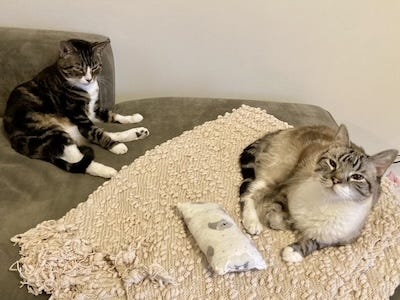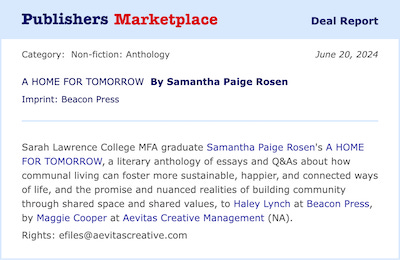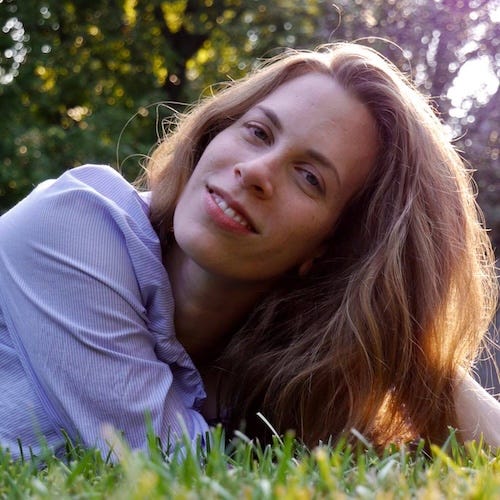I never thought I’d write a book. It’s not that I wasn’t interested in the endeavor, but rather that my perfectionism, anxiety, and likely my ADHD stood in the way. I felt overwhelmed by the idea of committing to a book-length project, and while much of my MFA cohort seemed to have clarity and self-assurance around their book ideas, I struggled with believing that I had enough to say for 200+ pages that other people would benefit from hearing.
I stuck to shorter pieces and in 2022, I wrote an essay for Catapult about moving in with my parents as I approached 30. It focused on the societal shame I felt, even though the living situation itself was positive for everyone involved.
After an editorial experience with me, a writer friend mentioned I’d be a good anthology editor. That intrigued me. The collaborative nature of an anthology felt less intimidating and more generative than writing an entire book myself. And I found the subject of my Catapult essay— communal living—endlessly fascinating. I already enjoyed learning about different ways people were building more supportive lives together—from multigenerational homes to cohousing communities to living with friends or adult siblings. Between the book’s collaborative format, my own genuine interest in the subject, and its cultural timeliness given the housing crisis and loneliness epidemic, I felt compelled to try.
Was I afraid to fail? Not so much. Since my biggest source of anxiety over writing a book was that I didn’t think I could do it well enough, I let my excitement about the project drive me forward and I put everything I had into developing the proposal. The more I learned about the process and the more concrete my book became, the more convinced I grew that the idea was substantial and the more confident I felt.
Less than six months (of many nights and weekends spent researching and writing) later, I had an agent. Here’s a glimpse into what I learned.
Lead-up:
I read book proposal and query letter guidelines and examples (shoutout to Jane Friedman and Eric Smith’s resources) and wrote my proposal over a total of 3-4 months. This list piece I’d published months before, when I had no idea I’d ever make use of it myself—“7 Newsletters That Will Help Get Your Book Published”—was also useful.
The research and writing period of working on the proposal included reading already published anthologies in order to clarify my vision, and talking to a few anthology editors about their experiences. Did I spend 100 hours on this proposal? More? Let’s just say I declined many social invitations.

I knew of a few literary agents but not many, so I started researching who represented writers I admired, including Mac Crane, James Frankie Thomas, Gina Chung, Ruth Madievsky, Alisson Wood, and, in fact, Emi Nietfeld. (People thank their agents in the acknowledgement sections of their books!) I looked into what kinds of material these agents were interested in, either on their agency’s website or on Manuscript Wish List. I wanted a hands-on, editorial agent, so I sometimes reached out to writers I knew (or didn’t know!) to ask whether this was true of their agents.
I wrote my query letter with a personalized intro for each agent, and I ultimately got nine requests for my proposal, which felt big! The fact that so many agents were interested made me feel like my idea held value.
Impact:
I got offers from two of the agents I wanted to work with most. It was such a confidence boost not just to get the agent, but also to be able to go from knowing nothing about a process and industry to being able to educate myself and share what I’ve learned.

What worked:
Putting more time and research than I even thought possible into the proposal. Pretty much every agent response I got was kind and respectful, and I think this was because I demonstrated that I had a serious project I’d put serious time into. Throwing myself into the research and writing also kept me busy enough that I didn’t have time to entertain doubts.
Making it a communal process. When I reached out to peers about their agents, everyone was generous. And while not my original intention, sometimes our conversations led them to say, “Feel free to tell my agent I recommended you!” Querying agents and writing books can be a solitary process, but connecting with my peers enhanced my excitement for my project and made the process less lonely and anxiety-provoking. I know that getting feedback and encouragement fuels my creativity and my belief in my own work, which kept the project moving forward.
Relying on insider tips. Once you've had one agent request to read your proposal, you can let the other agents you've queried know, which may encourage them to request if interested. This worked well for me, leading agents to either ask to read the proposal or step aside faster. I did the same thing when I got my first offer.
Strategies to reconsider:
Reaching out to a large batch of agents at once, which was a ton of work! Some people do smaller tiers of outreach. Perhaps I should have, but my impatience prevailed!
Querying right before the holidays (Nov-Dec). The process was extra stressful knowing some agents were going to be away from their desks for much of December.
Writing an anthology? There were agents who said no immediately because anthologies are hard to sell and don’t make much money. It does feel like the right format for this project and for me at this point in my writing journey; it’s just a lot of time invested in something I hope people will buy and read.
In conclusion:
The beautiful writer Hanif Abdurraqib posted a few months ago about realizing that “the lies I’ve convinced myself about my own work” were not true—something he only discovered when he was in community with others. I’ve learned from this process that I suffer from the same affliction. Telling myself for years that I wouldn’t be able to write a “good” book and that I didn’t have enough to say that others would want to hear held me back. Coming up with an idea that truly captured my attention helped me to push forward in spite of that narrative. I put in the work and the time; I was scrappy and innovative. And along the way, I formed community with writers and agents, which eased the intensity of those false beliefs.
It’s also worth noting that I have less than 600 followers across my social media platforms and none of the agents who responded seemed concerned. However, having a timely idea and solid proposal, big publications to my name, and substantial writer and editorial contacts probably made a difference. (See Emi’s insightful post mortem on the subject of social media!)
What’s next:
After polishing the proposal alongside my agent, the amazing Maggie Cooper, we sold the book within a month of being on submission—of course it felt like much longer. There’s still plenty of work ahead, but look out for A Home for Tomorrow in bookstores in Summer 2026! Anthologies need lots of love, so if you’d like updates on how you can support the book (as well as pottery and cat content) follow me on Instagram and Twitter!
Recommendations:
Book: Madwoman by Chelsea Bieker, which was recently published by Little, Brown. I tore through this novel about a suburban mother and wife with conflicting internal and external worlds who comically engages with every possible wellness trend in order to cleanse herself of her violent upbringing. I love a propulsive second-person novel and I’ve been in awe of Chelsea’s vivid, compelling writing and raw, embodied portraits of women and mothers since her debut novel Godshot. Also, the honest conversation about the writing process that Chelsea offers in her Substack “Make Up Your Life” always hits me right when I need it.
TV: Under the Bridge on Hulu. I liked this short series based on the Rebecca Godfrey book so much that I watched it twice in a row. It’s not easy viewing, as it tells the true story of a teenage girl’s brutal murder at the hands of her peers. There are many thought- provoking threads about harm and intention and misplaced anger and poverty that I don’t want to ruin here, so just watch it!
Movie: Backspot, which you can rent on Prime, is a cheerleading movie, but not the kind you’ve seen before. It’s intense, painful, and anxiety-provoking, and the stunts, which Devery Jacobs did herself, are extraordinary. I also love stories about queer high schoolers because that’s something I never go to be. Plus, is Devery one of the best actors of our time? Debate!
Podcast: Debutiful hosted by Adam Vitcavage. I started devouring these episodes while on submission and the candid conversations about both craft and industry are so fascinating and helpful. If you liked this Post Mortem, you will love the Debutiful podcast.
Music: Not Strong Enough by boygenius. I arranged an a cappella version of this song for my Philly-based singing group (if you live nearby, audition!) so it’s been high in my queue, alongside Chappell Roan’s debut album, The Rise and Fall of a Midwest Princess.
Hobby: Pottery, specifically the wheel! It’s positively thrilling to make things out of mud and I love the inertia (velocity? I never took physics) of the wheel. Pottery, for me, has also been an exercise in fighting my perfectionism because you can work really hard on something, but at the end of the day, the clay does what it wants to do—humbling, to say the least!
Samantha Paige Rosen is the editor of A Home for Tomorrow—a literary anthology about building community through shared space and shared values—forthcoming from Beacon Press in 2026. She has written about chronic illness, mental health, queerness, arts and culture, and social justice for publications including Slate, Washington Post, Electric Literature, BOMB, Literary Hub, and elsewhere. In addition to creative and content writing, Sam tutors and coaches writing outside of Philadelphia alongside her three cats. She earned her MFA from Sarah Lawrence College and is a proud Smith College graduate. Say hi at samanthapaigerosen.com or on social: Instagram @samanthapaigerosen, Twitter @samanthaprosen.










This is a pretty interesting article, as now I have a few on-line writer friends (and one in real life), I am more exposed to some of the trials and tribulations of being a writer, and I think, putting my MBA hat on, just because you are a writer, doesn't mean you don't do market research, figure out your target audience and how to sell your product. It's just that it's done differently. I just think it's awsome that you got what you are looking for by being "religious" about it in laying the ground work, doing the research, and then cast the net. That's awesome, especially when trying to break into a business.
BTW, in the email you sent to your agent, you referenced the US Women's National Soccer Team. Were you once a member?
Exhausting to read.